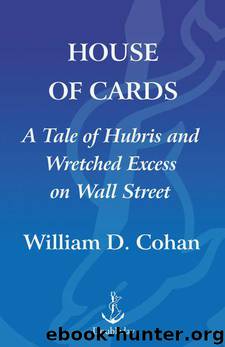House of Cards: A Tale of Hubris and Wretched Excess on Wall Street by Cohan William

Author:Cohan, William [Cohan, William]
Language: eng
Format: epub
Publisher: Anchor
Published: 2009-03-05T05:00:00+00:00
IN NOVEMBER 1993, Michael Siconolfi wrote an anecdote-filled 2,700-word front-page article in the Wall Street Journal peeling back the curtain on the firm's quirky, results-oriented culture. He was one of the paper's Wall Street reporters and would later—much to Cayne's chagrin and infuriation—influence a new generation of Journal reporters, such as Charlie Gasparino and Kate Kelly, in their highly critical coverage of Bear Stearns. In this article, Siconolfi compared Bear Stearns's opportunistic scrappiness to that of the Oakland Raiders, the bad boys of the NFL. Front and center was Howie Rubin, who, despite having been fired from Merrill Lynch for losing what Siconolfi pegged as $377 million, had been snatched up by the firm. “Its bet paid off,” Siconolfi wrote. Rubin's mortgage bond trading desk supposedly made some $150 million in profit in the fiscal year that ended in June 1993 and helped the firm make a record $362 million profit, allowing Cayne and Greenberg to take home $15.9 million each and Spector to get $11.7 million. “He's a superstar,” Cayne told the paper. Siconolfi explained that making such contrarian bets was part of the firm's DNA. That explained the hirings of Rubin, of Don Mullen, a former junk-bond salesman at the defunct Drexel Burn-ham, of Mustafa Chike-Obi, a mortgage trader fired from Kidder Pea-body because of a sexual harassment charge, and of investment bankers such as Curt Welling, from First Boston, and Dennis Bovin and Mike Urfirer, from Salomon Brothers and First Boston, respectively. Urfirer brought with him a $2 billion assignment to represent Martin Marietta on its attempted acquisition of Grumman, Bovin, and Urfirer then teamed up on Raytheon's $2.3 billion acquisition of E-Systems, earning a $14 million fee. Then Martin Marietta hired the duo to advise on its $10 billion merger with Lockheed, earning a $17 million fee. William Mayer, the former CEO of First Boston, observed that Bear Stearns “has been willing to take more risk on people and not let reputation or image be as much of a factor as other firms. Bear has been doing it quite successfully, as the Raiders have done over the years.”
Much was made in the article about the firm's zealous and elaborate risk management apparatus. There were the weekly Monday afternoon risk committee meetings, chaired by Greenberg, where traders were put through a “cold sweat” about how big their positions were and why they still held them on the firm's books. Greenberg received reports that showed the firm's inventory of securities that remained unsold after ninety days—a clear violation of his father's dictum about merchandise and one that Greenberg himself was supposedly adamant about not permitting. “You can come in and announce you've had the best week of your life,” Spector said, “and Ace will say, ‘You've got $50 million of bonds that are four months old—that's terrible. It's out of control…. You don't get to gloat.'” Even Rubin conceded he “felt like more of an island” at Merrill, but that at Bear, “if I take a larger position, I can grab” members of senior management to discuss it.
Download
This site does not store any files on its server. We only index and link to content provided by other sites. Please contact the content providers to delete copyright contents if any and email us, we'll remove relevant links or contents immediately.
International Integration of the Brazilian Economy by Elias C. Grivoyannis(111059)
The Radium Girls by Kate Moore(12028)
Turbulence by E. J. Noyes(8049)
Nudge - Improving Decisions about Health, Wealth, and Happiness by Thaler Sunstein(7706)
The Black Swan by Nassim Nicholas Taleb(7129)
Rich Dad Poor Dad by Robert T. Kiyosaki(6632)
Pioneering Portfolio Management by David F. Swensen(6300)
Man-made Catastrophes and Risk Information Concealment by Dmitry Chernov & Didier Sornette(6019)
Zero to One by Peter Thiel(5802)
Secrecy World by Jake Bernstein(4753)
Millionaire: The Philanderer, Gambler, and Duelist Who Invented Modern Finance by Janet Gleeson(4478)
The Age of Surveillance Capitalism by Shoshana Zuboff(4292)
Skin in the Game by Nassim Nicholas Taleb(4248)
The Money Culture by Michael Lewis(4207)
Bullshit Jobs by David Graeber(4190)
Skin in the Game: Hidden Asymmetries in Daily Life by Nassim Nicholas Taleb(4006)
The Dhandho Investor by Mohnish Pabrai(3765)
The Wisdom of Finance by Mihir Desai(3747)
Blockchain Basics by Daniel Drescher(3583)
